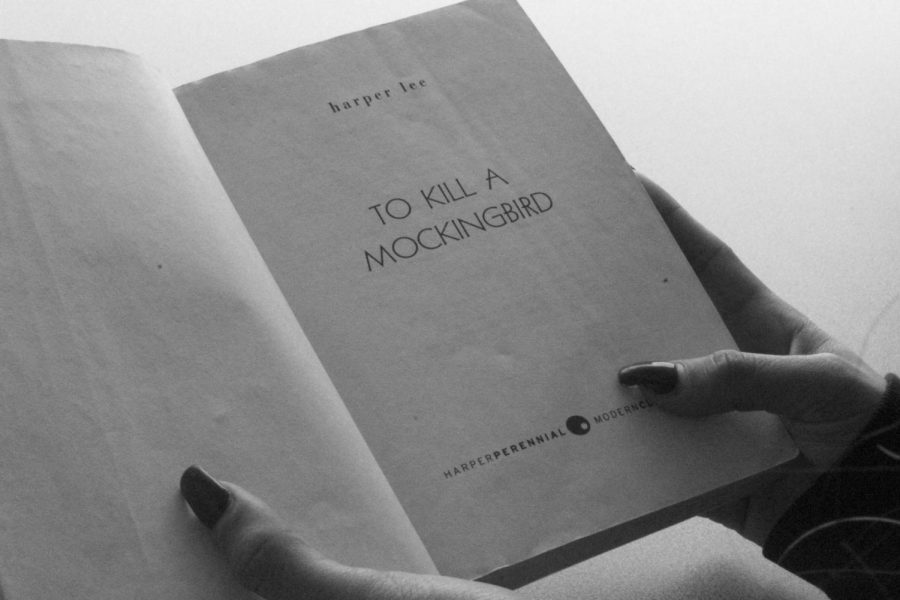Opinion: Replacing a classic is a mistake
“To Kill A Mockingbird,” once seen as a staple of the American school system, is now no longer taught — but why?
Krystal Zamudio and Kenzie Sroka
“To Kill a Mockingbird” is a classic taught in many public high schools around the U.S., but some schools have pulled it from its curriculum after concerns of a “white savior narrative” and made room for more diverse voices.
November 15, 2022
After talking with parents or other older relatives about their high school experiences one thing becomes apparent, they have all read a book that the school no longer teaches. It doesn’t seem all that surprising considering that things change, but what about a book that has been taught since the early 60s? “To Kill a Mockingbird” has been praised and criticized since its release because of the topics it covers. But just because this book can be controversial doesn’t mean that it should be pulled from classes.
In 1960, “To Kill A Mockingbird” was released with instant success, winning awards such as the Pulitzer Prize. Around 1963 is when the public school system began teaching the book to middle and high school students depending on the schools. Starting this year at MCHS, “To Kill A Mockingbird” is no longer a part of the English II curriculum, though some teachers have the option to teach bits and pieces of the book.
The main issue with this novel is the racism that is spread throughout. Using slurs and other harmful terms directed to a specific group of people is never a good thing to have in a book, and especially one that is being taught to kids. At the same time though, if those things are not taught and explained what is wrong with it, those kids will not know why it’s bad. Exposing kids to these types of topics and why those things can be harmful can allow them to try and change society for the better. That is only going to happen though if the teachers that are teaching the book are trained well and fully explain the topics, and have full discussions with their students.
As far as the slurs go, just remove them. Edit them out. It sounds harder than it really is. This option has been done before with books like Mark Twain’s Huckleberry Finn. NPR wrote, “The story will stay the same, but the N-word will be scrubbed from its pages 219 times. Alabama-based publisher NewSouth Books will replace Twain’s noun with the word slave.” Even that decision has had some backlash from teachers and librarians stating that those words are an important part of the story. That might be true to some extent but if removing those harmful terms allows these books to continue to be read and taught, then let it happen. In “To Kill a Mockingbird” the topics are strong enough that you don’t need those specific words to be in there for the messages to still be powerful.
This story gets buried in the negative reactions caused by this racism. Take a step back and think about it. This was written from the point of view of somebody living in the south in the 1930s, racism was unfortunately normal in that time period. Just like in a history class, this book describes what life was like in that time. The only thing that makes this book different from a history class is that it goes more in depth. If the book was written in a different time period and didn’t have straight racism in it, it would most likely still be being taught.
The racism in this book can be harmful and could very well not be taught right. If the teacher doesn’t get a good understanding of the material and the right and wrong things to talk about it could offend a student causing parents to get involved and the school taking the blame. The same situation could happen if a discussion gets out of hand. According to Marshal Libraries in 2020, “A white substitute teacher at the Mustang (OK) High School read the N-Word aloud from ‘To Kill A Mockingbird.’ The only black student in the class recorded the reading, notified the teacher that she was offended, and brought the matter to the attention of the principal. The district adopted a new policy stating that ‘racially charged language will no longer be spoken in classroom.’” Teaching students to read slurs or a teacher saying them, should not be something that is allowed in schools. A book with such a negative story, and a racist plot should not be taught to students.
This book may not be as commonly taught anymore, but it’s a book that everyone should have the chance to read. It covers the strengths and weaknesses of society, and even with the problems it has, the book has valuable lessons. With the message of understanding the value of empathy and the differences between yourself and others. “To Kill a Mockingbird” if taught right, can cause thought provoking conversations between students and teachers and allow views to change.











